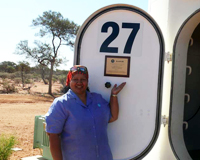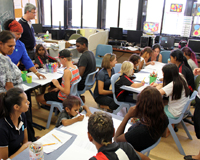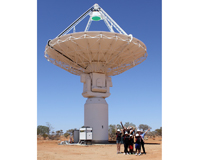Wajarri Yamatji People partner with the CSIRO
|
Leonie Boddington, CSIRO Aboriginal Liaison Officer |
|
CASS staff members work with students |
|
Students from the Pia Wadjarri Remote Community |
7 November 2014
This article was first published by the Yamatji Marlpa Aboriginal Corporation in October 2014.
Since signing an agreement in 2009, the Wajarri Yamatji people and the CSIRO have been engaged in a strong partnership as part of the ASKAP telescope project, located at the Murchison Radio-astronomy Observatory (MRO) on Wajarri Yamatji country. The project will form a world leading telescope consisting of an array of 36 antennas, each 12 metres in diameter. The telescope will offer unprecedented sensitivity over long areas of the sky. ASKAP will also pioneer and trial cutting edge technologies in the areas of electrical engineering, digital systems, computing and signal transport.
On 4 September, the Wajarri Aboriginal Corporation and Winja Wajarri Barna Limited, the trustee company for the agreement, held the official opening of their offices in Geraldton, Western Australia, coinciding with their AGM. The trust has been set up to manage the funds flowing from the ASKAP Agreement.
Des Mongoo, Executive Officer Wajarri Aboriginal Corporation says, “We have a great working relationship with the CSIRO in developing Community projects. We are working towards a sustainable future in ensuring the Wajarri Yamatji people benefit equally from the agreement. It is important to acknowledge the work done by the initial board in creating the partnership with the CSIRO, in particular, Anthony Dann and RPM project management for the facilitation of the signing of the ILUA.”
One of the key focuses of the agreement has been to provide education initiatives for Wajarri Yamatji students. A series of cadetships have already been taken up by three Wajarri Yamatji people, and the CSIRO cadetship program for Wajarri Yamatji people is set to run for 20 years.
The CSIRO has already visited the remote Pia Community School a number of times as part of a mentoring program. The next school visit is scheduled for the end of October when CSIRO scientists and employees will visit the school to conduct mentoring sessions with students. The school visit will also include a visit to the MRO, a rare opportunity for Pia School students to see this world-leading technology.
The CSIRO and Wajarri people have also been creating a 40 page educational resource looking at Wajarri Yamatji culture, the ASKAP and MRO generally. The resource has been trialled at Pia Community School and will be finalised later this month.
The MRO has been developed closely with Traditional Owners, the Wajarri Yamatji people. The CSIRO recognises the relationship of Aboriginal people have to their land.
Leonie Boddington, Aboriginal Liaison Officer for the project, says the CSIRO recognise that their spiritual and cultural connection to the land obliges the Wajarri people to look after cultural sites which are living museums of their ancestors.
“A small part of my job, which I love, is presenting a Heritage Induction to workers and visitors to the MRO. I get a chance to tell them about the Wajarri language,the Wajarri people and their land on which the MRO is built ‘gurlgamarnu yalyba, thana nganggurnmanha ilgarijirri’.”
Simon Hawkins, YMAC CEO, says “The CSIRO has shown a genuine commitment to working collaboratively with the Wajarri people. YMAC is very proud to have assisted with the negotiation of the agreement in 2009 which is now seeing the Wajarri Yamatji people gain long term benefits for their community. We wish the Wajarri Yamatji people all the best for their continuing partnership with the CSIRO on the ASKAP project.”
There are currently a number of Cadetships available with the CSIRO for Wajarri Yamatji People. If you are interested please contact YMAC for further information.
Back to Latest ASKAP News page.



